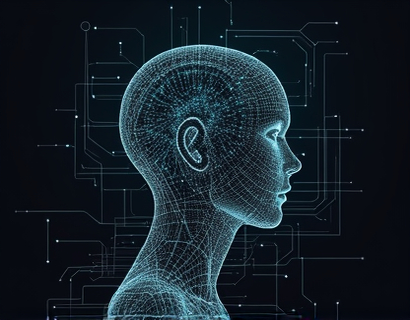AI-Powered Imaginative Companions: Transforming Childhood Creativity and Emotional Health
In an era where technology increasingly intersects with everyday life, the concept of AI-powered imaginative companions is emerging as a transformative force in childhood development. These digital entities, crafted through advanced artificial intelligence, are not mere games or apps but personalized companions designed to foster creativity, emotional health, and social skills in young children. This article delves into the profound impact of these AI-driven imaginary friends, exploring how they are reshaping the way children play, learn, and grow.
The Rise of AI-Driven Imaginary Friends
The idea of imaginary friends is not new; children have always created companions to accompany them in their play and adventures. However, the integration of artificial intelligence into this concept marks a significant evolution. AI-powered imaginary friends are dynamic, responsive, and capable of adapting to a child's unique personality, interests, and emotional needs. These digital companions are designed to engage children in interactive play, offering a safe and nurturing environment for exploration and growth.
Personalization at the Core
One of the most compelling aspects of AI-powered imaginary friends is their ability to offer personalized experiences. Through sophisticated algorithms and machine learning, these companions can understand and respond to a child's preferences, behaviors, and emotional states. For instance, if a child expresses sadness or frustration, the AI can detect these emotions and respond with comforting words or activities tailored to help the child feel better. This level of personalization ensures that each interaction is meaningful and relevant, enhancing the child's engagement and the overall benefits of the experience.
Fostering Creativity Through Interactive Play
Creativity is a vital component of childhood development, and AI-powered imaginary friends excel in stimulating this aspect. These digital companions engage children in a variety of creative activities, from storytelling and art to problem-solving and role-playing. For example, a child might embark on a virtual adventure where the AI companion suggests different scenarios, characters, and challenges. The child can then use their imagination to navigate these scenarios, fostering a rich and imaginative play experience. The AI's responsiveness and adaptability ensure that the play remains fresh and exciting, encouraging children to think creatively and explore new ideas.
Emotional Growth and Well-Being
Beyond creativity, AI-powered imaginary friends play a crucial role in supporting emotional growth and well-being. Children often struggle to articulate their feelings or cope with complex emotions, and these digital companions provide a safe and non-judgmental space for expression. Through conversations and interactive scenarios, children can explore and understand their emotions better. The AI can offer guidance and support, helping children develop emotional resilience and empathy. This is particularly beneficial for children dealing with anxiety, depression, or other emotional challenges, as the companions can provide consistent and reassuring presence.
Social Skills Development
Social skills are essential for a child's success in both personal and professional life. AI-powered imaginary friends contribute to the development of these skills by simulating social interactions and providing opportunities for practice. For instance, a child can engage in role-playing games where the AI acts as a friend, family member, or teacher. These interactions help children learn how to communicate effectively, understand social cues, and navigate different social situations. The AI can also offer feedback and suggestions, further enhancing the learning experience.
Safe and Nurturing Digital Space
In an age where online safety is a major concern, the creation of a safe and nurturing digital space for children is paramount. AI-powered imaginary friends operate within a controlled environment that prioritizes the child's well-being. The AI ensures that all interactions are positive, educational, and free from harmful content. Parents and guardians can rest assured that their children are engaging in a digital experience that is both enriching and secure. This environment allows children to explore and learn without the risks associated with unsupervised internet use.
Parental Involvement and Guidance
While AI-powered imaginary friends offer a wealth of benefits, parental involvement remains crucial. Parents can monitor their child's interactions, adjust settings to suit the child's needs, and engage in the play alongside their child. This shared experience not only strengthens the parent-child bond but also provides opportunities for parents to discuss and reinforce the lessons learned through the AI companion. For example, after a session where the AI helped a child manage frustration, parents can talk to their child about different ways to handle similar situations in real life.
Educational Integration
The potential of AI-powered imaginary friends extends beyond playtime into the educational realm. These companions can be integrated into learning environments to enhance educational outcomes. For instance, an AI companion can assist with reading by reading stories aloud, asking comprehension questions, and encouraging discussions. In science and math, the AI can present interactive lessons and puzzles, making learning more engaging and effective. Teachers can also use these tools to create personalized learning experiences for each student, catering to diverse learning styles and needs.
Research and Development
The field of AI-powered imaginary friends is rapidly evolving, with ongoing research and development pushing the boundaries of what these digital companions can achieve. Studies are being conducted to better understand the long-term impacts of these interactions on children's cognitive, emotional, and social development. Researchers are exploring how AI companions can be tailored to address specific developmental challenges and how they can be integrated into educational curricula. The insights gained from these studies will further refine and enhance the capabilities of these digital companions.
Challenges and Considerations
Despite the numerous benefits, there are challenges and considerations that need to be addressed. One key concern is the potential for over-reliance on digital companions, which could limit face-to-face social interactions. It is essential to strike a balance between digital and real-world play. Additionally, ensuring the ethical use of AI and protecting children's data privacy are critical. Developers must adhere to strict guidelines and regulations to maintain the trust of parents and guardians.
Conclusion
AI-powered imaginary friends represent a groundbreaking advancement in childhood development tools. By offering personalized, interactive, and safe digital companions, these technologies are revolutionizing how children play, learn, and grow. The combination of creativity, emotional support, and social skills development provided by these companions makes them invaluable assets in today's digital age. As research continues to evolve, the potential for these AI-driven imaginary friends to positively impact children's lives is immense, paving the way for a future where technology and childhood development go hand in hand.











































